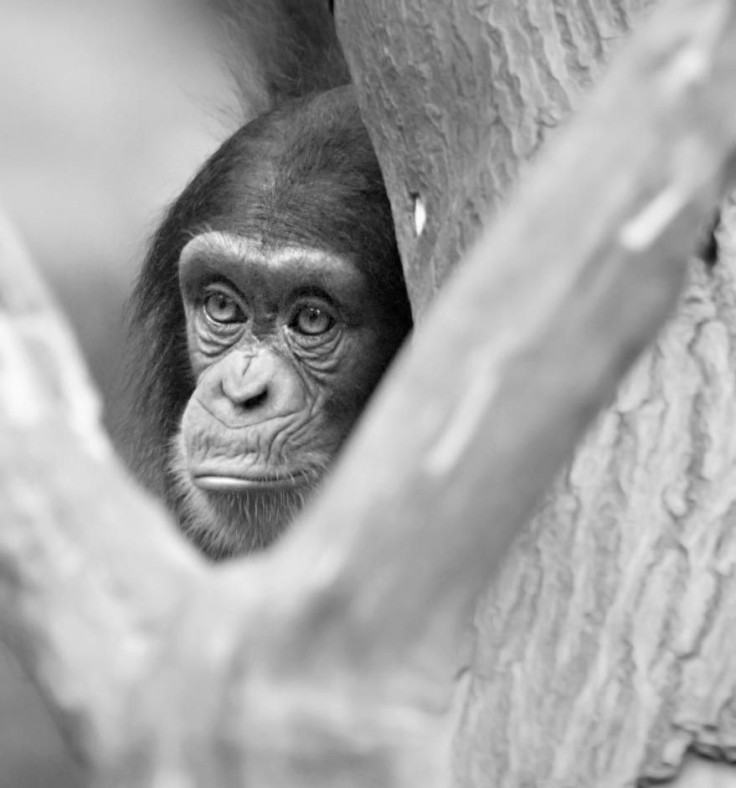Hotheaded: Emotions Play Role In Ape Decision-Making, With Chimpanzees Most Likely To Take Risk

Like us, chimpanzees and bonobos — our closest phylogenetic cousins in the animal world — respond emotionally to chance outcomes based on their own decisions.
Reminiscent of any home-plate confrontation on a Major League baseball field, or players manning games of chance in a 24-7 casino in Las Vegas, these higher primates respond with apparent emotive thought when risk-taking strategy fails to pay.
Along with Brian Hare from Duke University, Alexandra Rosati of Yale University assessed the emotional responses and motivation of chimpanzees and bonobos living in African sanctuaries, publishing the study Wednesday in the open-access journal PLOS ONE. "Psychologists and economists have found that emotions play a critical role in shaping how humans make complex decisions, such as decisions about saving or investing money," Rosati told reporters. "But it was not known if these processes are shared with other animals when they make decisions about their important resources — such as food."
Among those tested were chimpanzees ranging within the Tchimpounga Chimpanzee Sanctuary in Pointe Noire, Republic of Congo, and bonobos from Lola ya Bonobo Sanctuary there in Kinshasa, most of whom had been born in the wild but orphaned by the bushmeat trade. Unlike other species, chimpanzees and bonobos do relatively well in semi-captivity, and are deemed psychologically fit for the purposes of research.
In the study, investigators presented apes with two different types of challenges. In one, apes decided whether to delay gratification for a better reward — a problem many humans face every day. In the other, they decided whether to take gamble on the chance of a higher reward at risk of obtaining only a lesser one, in this case a "non-preferred" food item. For chimpanzees, bread and banana were the highest possible awards, while chimpanzees prefer apple and banana. Food awards evincing the emotional displays — moaning, scratching, or banging forcibly on bars and mesh barriers — were papaya and cucumber for chimpanzees, and peanut butter and lettuce for bonobos.
Both species showed emotional responses to the outcomes of their choices but, interestingly, researchers found chimpanzees to be more patient and likely to take risk than bonobos. When losing in the gambles, members of both species displayed emotional outbursts thought to express anger, including vocalizations similar to pouts and moans, scratching, and banging — a temper tantrum. And upon losing at the risky choice game, the apes tried retroactively to switch choices, something they never did when winning. Some of the demonstrations, researchers said, reflected responses specific to their species while others reflected personality differences between individuals.
"Across all choice trials, chimpanzees chose the risky reward 64.9 percent, significantly above chance," Rosati said. "Bonobos, in contrast, chose the risky option on 39.3 percent of trials, below chance." But the chimpanzees, more tolerant than bonobos on average of risk, were gambling drunkenly with neither rhyme nor reason. The differences between the two species held under multiple analyses, with the chimpanzees' risk-assessment adapting to changing circumstance. The animals all chose less risk as the value of lesser reward increased.
"Chimpanzees chose the risky option more often than bonobos when the safe option offered one or three pieces of food, but not when the safe option offered six pieces," Rosati wrote. "This suggests that both species modulated their preferences across different safe option values, and converged to similar levels of choice when the value of the safe option became large."
These results, the researchers concluded, support previous findings that chimpanzees are more apt to take risk than bonobos. However, chimpanzees were also shown to be less patient than bonobos while waiting during the temporal study, complaining louder with vocalizations, along with a greater degree of scratching and biting.
The Underlying Mechanism
But the two studies raised many questions from the researchers, who wondered about the mechanisms by which the two species modulate their choices when faced with tough decisions. Perhaps the strong motivation on the part of chimpanzees to achieve higher rewards, despite the emotive demonstrations when chance turned against them, indicates that only bonobos modulated decisions based upon previous outcomes. Or perhaps the two species differ in their abilities to regulate emotional responses in some contexts, such as in response to receiving the lower reward.
While "humans are able to exert cognitive control over their emotional response, in particularly by reappraising how they view events," the researchers wrote, "evidence from apes suggests that individuals may be able to engage in some relevant regulatory behaviors while waiting" for results — and that chimpanzees and bonobos might differ as species in their ability to regulate that emotion. The researchers also acknowledged that underlying biological mechanisms might differ significantly between the two species, as seen in the analogous instance when individuals compete for food.
"While both species show similar behavioral responses when faced with competition with partners of various relative dominance status, these behaviors are supported by different underlying biological mechanisms: chimpanzees exhibit changes in testosterone in response to unequal-sharing situations, whereas bonobos exhibit changes in cortisol," the researches said.
In these games of chance, the psychological experiences of the two species might have differed in subtle ways not captured by the researchers, given that delineating fine-grained differences in emotion is all but impossible in animals who cannot provide self-reports.
Future research, they said, would consider whether these emotional responses play a causal role in decision-making, as they do in humans.
Source: Rosati AG, Hare B. Chimpanzees and Bonobos Exhibit Emotional Responses to Decision Outcomes. PLOS ONE. 2013.
The video below shows bonobos making choices in the temporal study:



























